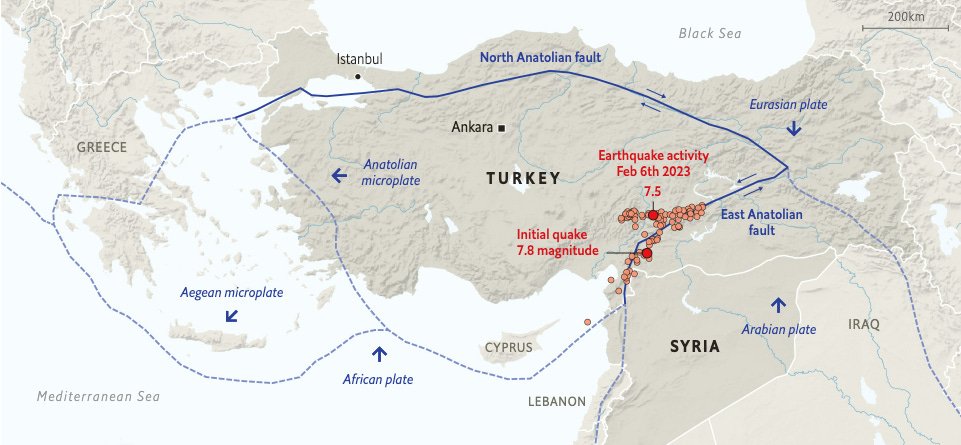The devastating earthquake that struck Turkey and Syria on February 6, 2023, left an indelible mark on the region. Measuring 7.8 on the Richter scale, it was the most powerful earthquake to hit Turkey in modern times, with its epicenter near Gaziantep. The seismic event caused widespread destruction, particularly in southeastern Turkey and northwestern Syria, and has so far claimed the lives of thousands. The World Health Organization (WHO) has warned that the death toll could exceed 20,000 as rescue operations continue and the full extent of the damage becomes clear. The earthquake’s impact extended as far as Greenland, underscoring its sheer magnitude.

The devastating earthquake that struck Turkey and Syria on February 6, 2023, left an indelible mark on the region. Measuring 7.8 on the Richter scale, it was the most powerful earthquake to hit Turkey in modern times, with its epicenter near Gaziantep. The seismic event caused widespread destruction, particularly in southeastern Turkey and northwestern Syria, and has so far claimed the lives of thousands. The World Health Organization (WHO) has warned that the death toll could exceed 20,000 as rescue operations continue and the full extent of the damage becomes clear. The earthquake’s impact extended as far as Greenland, underscoring its sheer magnitude. In both Turkey and Syria, this disaster struck at a time when both nations were already facing severe socio-economic and political challenges. In Turkey, a deepening cost-of-living crisis, exacerbated by inflation and declining living standards, had already created widespread discontent. This same regime, now facing the aftermath of this disaster, bears significant responsibility for the scale of destruction, as many of the collapsed buildings failed to meet basic safety standards, a direct consequence of compromised regulations.
Syria, on the other hand, is still reeling from the effects of a brutal civil war that has ravaged the country for over a decade. The war, stoked by foreign interventions and internal conflicts, left much of the country’s infrastructure already in ruins. In the rebel-held northwest, where the earthquake hit hardest, entire villages were flattened. The ongoing conflict has further hampered relief efforts, as road damage and governmental restrictions have made it difficult to deliver aid to affected regions. Additionally, the international response to the disaster in Syria has been marked by geopolitical tensions, with many Western countries refusing to engage directly with the Assad regime, complicating efforts to assist those in need.
In Turkey, the disaster has reignited debates over government accountability and corruption in the construction sector. It is well known that Turkey sits between the North and East Anatolian Faults, making it highly prone to seismic activity. Yet, despite numerous warnings from scientists about the inevitability of a major earthquake, safety measures were insufficient. In particular, a 2018 law passed by the Erdoğan government allowed for a “zoning amnesty,” which legalized buildings that did not meet earthquake-resistant standards, in exchange for a fee. This move further undermined construction safety regulations, contributing to the catastrophic loss of life witnessed in the earthquake.
Turkey’s recent history has been marked by a series of similar disasters, including the 1999 İzmit earthquake, which resulted in around 18,000 deaths. In the aftermath of that tragedy, there were widespread arrests of corrupt contractors who had cut corners on building materials, yet the culture of corruption persisted. Investigations from that time revealed that some contractors had mixed sea sand into concrete, reducing the structural integrity of buildings. Despite promises of reform, it appears that little has changed, as evidenced by the collapse of recently constructed buildings that should have been able to withstand earthquakes of this magnitude.
Erdoğan, whose political rise has been closely linked to his relationship with the construction industry, has long used this sector as a tool for political and economic growth. Under his leadership, public lands and state buildings were privatized, and construction companies were granted licenses to bypass regulations. These close ties have allowed the sector to expand rapidly, but at the cost of safety and accountability. Now, with hospitals, schools, and other public buildings among those that collapsed, the human toll of these policies has become undeniable.
Amid the tragedy, declared a three-month state of emergency in the affected areas. While this may grant the government additional powers to coordinate rescue efforts, critics fear that it could also be used as a political tool ahead of upcoming elections, especially asces growing opposition. His government’s previous attempts to ban the main opposition party, the HDP, and his harsh crackdowns on dissenting voices have raised concerns that the state of emergency could be exploited to further stifle political rivals.

International responses to the disaster have varied, with many countries sending rescue teams to Turkey, but Syria has not received the same level of support due to ongoing geopolitical conflicts. Western nations, in particular, have been reluctant to provide direct aid to the Syrian government, instead choosing to focus on rebel-held areas. This has left much of Syria without adequate assistance, further compounding the suffering of a population already devastated by years of war and sanctions.
Ultimately, the destruction wrought by the earthquake in Turkey and Syria is a stark reminder of the cost of corruption, negligence, and poor governance. While the earthquake itself was a natural event, the scale of the disaster was largely man-made. Both nations now face the immense challenge of rebuilding, not only their physical infrastructure but also the trust of their people in the ability of their governments to protect and serve them. The international community must also reflect on its role in exacerbating the crises in these regions, as geopolitical conflicts continue to hinder relief efforts and undermine the safety and security of those most in need.

